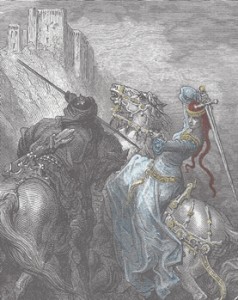Pèire at Work

Readers must be able to form their own pictures of characters.
However, Peire Leteric resembles this 90-year-old Catalan gentleman we met in Tortella, who showed us how to polish a wooden spoon with a bone tool. He was gut-shot in the civil war, but went on to a joyous life after Franco.
What Chrètian Sang

Chrètian is a jongleur — a singer — not a troubadour (a writer of songs).
He’s among the secular singers, who began to appear at the turn of the millennium. The jongleurs’ role as entertainers flowered with the rise of the troubadour poets. The troubadours are nobles, the jongleurs are not.
Chrètian would have to sing for his supper — were he not making his living wage principally with his sword. Although our Chrètian knows how to read, like all jongleurs he memorizes the odes and long epics, and might choose his own melody.
Chrètian, however, first learned to sing among the ancient Norman crusaders on Cyprus, and then learned trouvères’ songs about the Grail and Arthur’s Court while he and Tomás worked as mercenaries in Burgundy.
Hear some best guesses at what the music Chrètian sang sounds like:
Music of the Crusades, Early Music Consort of London, Decca.
Music of the Troubadours, Ensemble Unicorn, Naxos.
If you live in the Pacific Northwest, like I do, you can hear live voices:
Capella Romana
Medieval Women’s Choir
Another Entitled Woman Dressed as a Man?
 To ask related and similar questions:
To ask related and similar questions:
- Another fictional history written in the current English vernacular?
Or did you not need a crib-sheet when you first read Chaucer, Beowulf — or most of Shakespeare, for that matter? Did you read Homer in archaic Greek? Songs of the troubadours in Provençal? - Where’s the exciting historical fiction about laundry women and camp-followers — who held (per the historical) the only roles for “working class” women in the age of the Crusades?
Writers who use a historical backdrop for stories have certain limited choices:
- Follow the historical record closely while bringing the tensions and activities to life for modern readers, but moving beyond the strictures of biographers or academics. Robert Hughes does this for Rome.
- “Costume” every-day life with period social manners, politics, technology, and so on, while creating characters that modern readers can identify with. Many writers in historical romance for women or men take this tact, like Bernard Cornwell’s adventures.
- Investigate the historical gestalt with a time-traveling viewpoint character to tell the story. Diane Gabaldon does this in the Outlander series.
Accidental Heretics is principally a costume-drama, following a sympathetic character through the hazardous Languedoc landscape of 1210. So Isabella is sometimes in disguise. It would be wonderful if I could claim for her the great pants roles like Rosalind or Viola. But Isabella is just a poor, backwoods widow, doing the best she can in bad circumstances. In leather leggings.
Credit: Art based on “Florine of Burgundy” in Doré’s Illustration of The Crusaders.
